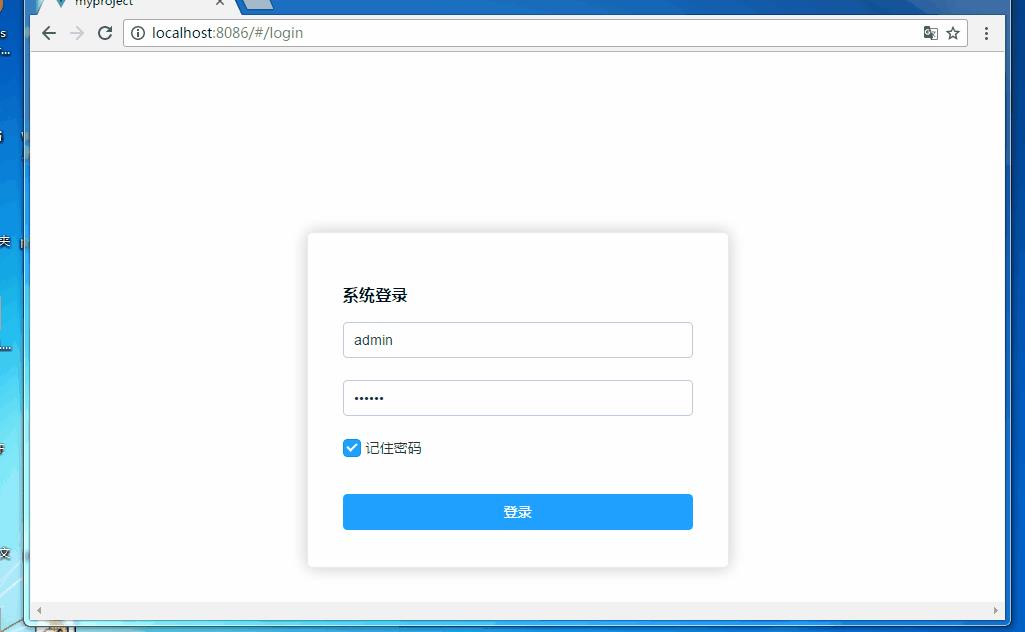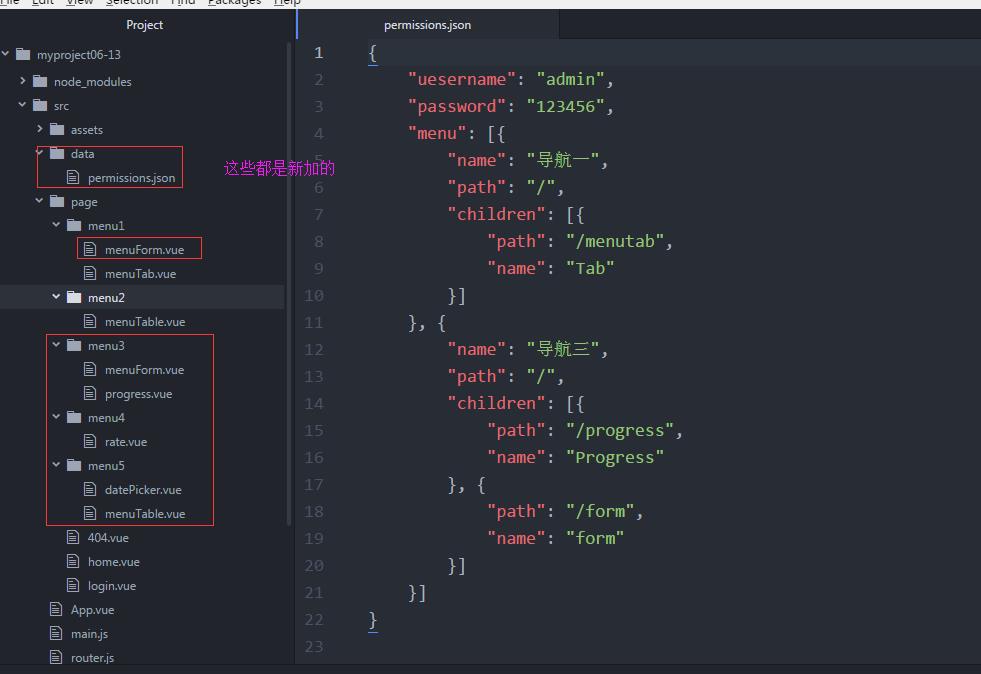vue-router如何根据不同的用户给不同的权限
Posted 爱喝酸奶的吃货
tags:
篇首语:本文由小常识网(cha138.com)小编为大家整理,主要介绍了vue-router如何根据不同的用户给不同的权限相关的知识,希望对你有一定的参考价值。
闲聊:
小颖去年在上家公司用的vue1.0之前在做路由这块用的router.map,但是现在vue2.0里已经不能用了,所以之前解决权限问题的例子,小颖也参考不了呜呜
之前看一个美女写的:elememtui(有关权限的那些事) 小颖也想试试怎么根据不同的用户,给不同的访问菜单权限,昨天下午小颖试了好久,都没弄好,用户刚登陆进去菜单栏是好的,但是当页面一刷新,左侧的菜单就不见了,但当小颖点击了别的地方后,左侧的菜单栏又能出来了,阿西吧擦,昨天折腾了小颖一下午,在下班前还是没弄好,回去因为才搬了家房子乱的得收拾房间,所以也就没带电脑回去,早上来竟然弄好啦弄好啦弄好啦嘻嘻嘻,下面我们就一起来看看小颖写的代码吧嘻嘻。

效果图:

项目是基于小颖之前写的那个demo来写的这里小颖就只把重要的代码给大家粘出来,剩下的大家请移驾到:vue2.0+element+node+webpack搭建的一个简单的后台管理界面 来看其他的代码。
更新后的项目目录:

注意:小颖之前没有用到es6,现在小颖引了es6,具体怎么引请看这里:webpack es6支持配置
如果遇到问题:Vue2.0 新手完全填坑攻略—从环境搭建到发布——DT
新建json文件:
permissions.json
{ "uesername": "admin", "password": "123456", "menu": [{ "name": "导航一", "path": "/", "children": [{ "path": "/menutab", "name": "Tab" }] }, { "name": "导航三", "path": "/", "children": [{ "path": "/progress", "name": "Progress" }, { "path": "/form", "name": "form" }] }] }
menuForm.vue
<template lang="html"> <div class="menu-form"> <el-form :model="numberValidateForm" ref="numberValidateForm" label-width="100px" class="demo-ruleForm"> <el-form-item label="年龄" prop="age" :rules="[ { required: true, message: \'年龄不能为空\'}, { type: \'number\', message: \'年龄必须为数字值\'}]"> <el-input type="age" v-model.number="numberValidateForm.age" auto-complete="off" class="demo-ruleForm-input"></el-input> </el-form-item> <el-form-item> <el-button type="primary" @click="submitForm(\'numberValidateForm\')">提交</el-button> <el-button @click="resetForm(\'numberValidateForm\')">重置</el-button> </el-form-item> </el-form> </div> </template> <script> export default { data() { return { numberValidateForm: { age: \'\' } }; }, methods: { submitForm(formName) { this.$refs[formName].validate((valid) => { if (valid) { alert(\'submit!\'); } else { console.log(\'error submit!!\'); return false; } }); }, resetForm(formName) { this.$refs[formName].resetFields(); } } } </script> <style lang="css"> .demo-ruleForm-input{ width: 300px; } </style>
progress.vue
<template lang="html"> <div class="progress-content"> <el-progress type="circle" :percentage="0"></el-progress> <el-progress type="circle" :percentage="25"></el-progress> <el-progress type="circle" :percentage="100" status="success"></el-progress> <el-progress type="circle" :percentage="50" status="exception"></el-progress> </div> </template> <script> export default { } </script> <style lang="css"> </style>
rate.vue
<template lang="html"> <div class="block"> <span class="demonstration">区分颜色</span> <el-rate v-model="value2" :colors="[\'#99A9BF\', \'#F7BA2A\', \'#FF9900\']"></el-rate> </div> </template> <script> export default {} </script> <style lang="css"> </style>
datePicker.vue
<template lang="html"> <div class="date-picker"> <div class="block"> <span class="demonstration">带快捷选项</span> <el-date-picker v-model="value2" align="right" type="date" placeholder="选择日期" :picker-options="pickerOptions1"> </el-date-picker> </div> </div> </template> <script> export default { } </script> <style lang="css"> </style>
实现路由限制的代码:
1.login.vue中将原来的handleSubmit2方法进行修改,通过ajax访问本地json然后再判断当前用户是谁有什么权限,小颖这里只写了一个admin,其实真是的数据里应该会有很多个用户,然后大家再判断当前登录的用户是谁,然后获取相应的权限,这里小颖就不给大家演示了嘻嘻。
handleSubmit2(ev) { var _this = this; _this.$refs.ruleForm2.validate((valid) => { if (valid) { _this.logining = true; var loginParams = { username: this.ruleForm2.account, password: this.ruleForm2.checkPass }; _this.$http.get(\'/src/data/permissions.json\').then(response => { // get body data var someData = JSON.parse(response.bodyText); if (loginParams.username == someData.uesername && loginParams.password == someData.password) { _this.logining = false; sessionStorage.setItem(\'user\', JSON.stringify(loginParams)); sessionStorage.setItem(\'menu\', JSON.stringify(someData.menu)); _this.$router.push({ path: someData.menu[0].children[0].path }); } else { _this.logining = false; _this.$alert(\'用户名或密码错误!\', \'提示信息\', { confirmButtonText: \'确定\' }); } }, response => { // error callback }); } else { console.log(\'error submit!!\'); return false; } }); }
2.home.vue中的mounted()方法更新为:
mounted() { var user = sessionStorage.getItem(\'user\'); if (user) { user = JSON.parse(user); this.sysUserName = user.username || \'\'; } var _this = this; _this.menuData = JSON.parse(sessionStorage.getItem("menu")); _this.$router.options.routes.forEach(function(item) { _this.menuData.forEach(function(menu) { if (item.name == menu.name) { item.hidden = false; if (menu.children && item.children) { item.children.forEach(function(children1) { menu.children.forEach(function(children2) { if (children1.name == children2.name) { children1.hidden = false; } }); }); } } }); }); }
以上是关于vue-router如何根据不同的用户给不同的权限的主要内容,如果未能解决你的问题,请参考以下文章
